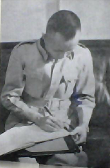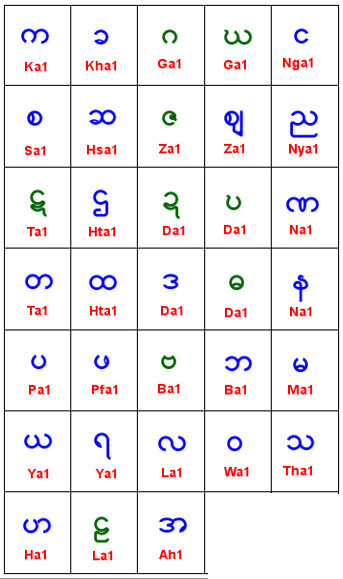Bogyoke Aung San's Writing Style
Burmese independence hero General Aung San was an avid reader, and known to be talented in writing. In November 1933, still in his college days, he won a competition to translate a passage from English to Burmese under the pen-name ပဲခူးကဝေ | ba1-go3 ka1-way2, which appeared in ဂန္တလောက မဂ္ဂဇင်း | gun2-da1 lau3-ka1 Magazine.
He also had a pseudonym အညာသားလေး | a-nya2-dtha3 lay3 with which he wrote two articles in June and August 1935 editions of သူရိယ မဂ္ဂဇင်း | thu2-ri1-ya1 Magazine.
Other articles in his college days include လောကဝိဟာ | lau3-ka1 we1-ha2 in 1937 September edition of မျိုးညွန့်မဂ္ဂဇင်း | myo3 nyoon1 Magazine where he expressed his opinion on the meaning of education, and ကျောင်းသားဝတ္တရား | kjoun3-dtha3 woot-ta1-ya3 meaning "responsibility of students" in November 27th 1937 issue of မန္တလေးသူရိယ | mun3-da1-lay3 thu2-ri1-ya1. He was then known as တက္ကသိုလ် ကျောင်းသား ကိုအောင်ဆန်း | tet-ka1-tho2 kjoun3-dtha3 ko2 oun2 hsun3.

In his earlier years of short political career, Bogyoke Aung San used the pen-name သခင်အောင်ဆန်း | tha1-khin2 oun2 hsun3. Articles appeared in ဒဂုန်မဂ္ဂဇင်း | da1-gome2 Magazine and နဂါးနီစာစောင် | na1-ga1-ni2 sa2-zoun2.
During Japanese Occupation, on the day Japanese announced "Independence" of Burma (August 1st., 1943), General Aung San wrote an article in the special edition of ဗမာ့ခေတ် | ba1-ma1 Khit newspaper with the title ဗမာ့လွတ်လပ်ရေး အရေးတော်ပုံ | ba1-ma1 loot-lut-yay3 a-yay3-dau2-bone2 (Chronicle of Burma's Independence). Here's an excerpt:
ကမ္ဘာစစ်ကြီး အမှန် ဖြစ်ချေတော့မည်။ ဗမာ့အခြေကား အသို့နည်း။ ဗမာတွေ ဘာလုပ်ကြမည်နည်း။ ဤပြဿနာများကား ကျွန်ုပ်ရှေ့တွင် အလျှို အလျှို တသီကြီး ပေါ်လာလေတော့၏။ တခုတည်းသော အဓိဌာန်ကို ရုတ်ခြည်း ကျွန်ုပ်ပြုလိုက်၏။ ငါ့အတွက် ဖြစ်လိုရာ ဖြစ်စေတော့၊ ငါ၏ နိုင်ငံ လွတ်လပ်ရေးအတွက် မနေမနား စွန့်စား လုံးပမ်းတော့အံ့။ ဤအဓိဌာန်ကို သန်သန်ကြီး ပြုလုပ်မိတော့၏
Here's my version of translation:
(Second) World War is about to become a reality. What's the situation like for Burma? What shall we Burmese do? Those challenges appeared in my stream of thoughts one after another. I immediately made a sole determination. I shall leave my life to fate alone and let it be. But, for the independence of my country, I shall struggle fervently and make a fearless venture with a restless heart. Such was the iron determination I made with an unyielding spirit.
General Aung San never had the time to write books during his struggle for independence, but he had indicated the desire to retire from politics and write books after the independence on subjects like politics, history, family affairs and education of children based on his belief system and point of view. The following was what he told တက္ကသိုလ်နေဝင်း | Tet-ka1-tho2 Nay2 Win3 (also known as ဗိုလ်ထွန်းလှ | Bo2 Htoon3 Hla1) in April 1947.
လွတ်လပ်ရေးရပြီးရင် ငါကတော့ နိုင်ငံရေးကထွက်ပြီး စာတွေရေးမယ်၊ နိုင်ငံရေးတွေ၊ ရာဇဝင်တွေအပြင် အိမ်ထောင်ရေးနဲ့ သားသမီး စောင့်ရှောက်ပြုပြင်ရေး တွေနဲ့ ပတ်သက်လို့ ငါ့ အယူအဆ သဘောထားတွေကိုပါ စါအုပ်ရေးမှာဘဲ
One can only wonder what kind of additional contributions he would have made to the elegance of Burmese literature and the spirit of Nationalism. Bogyoke Aung San did not live to see the independence of Burma. He was assassinated in the gloomy morning of July 19th, 1947.
(Reference: Writing Style of Bogyoke Aung San by Mya Han; Ava Publishing House, January 1998. မှီငြမ်းကိုးကားသောစာအုပ်-- သုတေသနမှုး ဆရာဦးမြဟန် ရေးသားသော ဗိုလ်ချုပ်အောင်ဆန်း၏ စာပေလက်ရာ၊ အင်းဝစာပေတိုက်၊ ၁၉၉၈၊ ဇန်နဝါရီလ)

